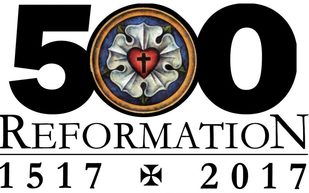 Five hundred years ago today, October 31, 1517, a German monk named Martin Luther nailed 95 theses, or “propositions” in logical sequence, onto the door of the Wittenberg Castle Church. In these theses, he challenged the sale of indulgences, ecclesiastical writs absolving the buyer of time in purgatory for sins committed. Luther argued that the entire system, abused even as it was, amounted to a rejection of the Gospel of Jesus Christ as revealed in Scripture. Once the gauntlet was thrown, the whole system of church teaching was suddenly exposed to the piercing light of God’s holy word, and the Protestant Reformation was born. The Protestant Reformation of the sixteenth century was a complex series of events over many decades. Yet at its heart, for all its complexity, the Reformation was driven by a concern for the supremacy and sufficiency of Jesus Christ in all areas of the church’s life. That is to say, Protestants then and now confess that God in Christ is aided by no others in his saving work, and that we can add nothing more to his victory over sin and death. We can see this working itself out in three key ways:
The Anglican Church descends from the Christian church in England, which was reformed along these lines at the time of the Protestant Reformation. And so all of these things affect our life at Holy Trinity today.
Our common prayer quite intentionally proclaims the Gospel as the sixteenth century Protestants insisted the Bible describes it, supremely, sufficiently, and entirely. We thank God that he has given us reformers in his church to hold us accountable to God’s Word in Scripture. We thank him that he sends us brave teachers to point us only and finally to Jesus Christ. We thank him that he has made each one of us to be his adopted sons and daughters by grace alone, through faith alone, and not on account of our works, so that no one, certainly not clergy, certainly not the “super Christian,” can boast before God. His grace toward us in Jesus Christ is supreme and sufficient for us all. On this 500th anniversary of the Protestant Reformation, let us thank God for giving us the Gospel of Christ, and the freedom of the children of God.
0 Comments
Series OverviewOn Wednesday nights throughout the next nine months, we will be walking our way through the Bible, from Genesis to Revelation, learning the story of salvation, especially how everything points to and is fulfilled by Jesus. Lesson 6: Planting Seeds |
|||||||||||||||||||
| god_becomes_man_l06_planting_seeds.mp3 | |
| File Size: | 89603 kb |
| File Type: | mp3 |
Series Overview
Lesson 5: Destruction of the Kingdom
Lesson Overview
Key Text(s): Genesis 6:1-9:17
Office Texts: Psalms 46, 124, Genesis 9:1-17; 2 Peter 3:1-13
Media
Click below to download the audio recording.
| god_becomes_man_l05_destruction_of_the_kingdom.mp3 | |
| File Size: | 97553 kb |
| File Type: | mp3 |
Series Overview
Lesson 4: Abdication
Lesson Overview
Key Text(s): Genesis 3 and 4
Office Texts: Psalm 51, Genesis 3, Matthew 3:13-4:11
Media
Click below to download the audio recording.
| god_becomes_man_l04_abdication.mp3 | |
| File Size: | 103487 kb |
| File Type: | mp3 |
Fr. Adam Rick
A prayerbook Christian with a patristic twist.
Archives
September 2021
July 2021
April 2021
February 2021
November 2020
August 2020
May 2020
March 2020
October 2019
June 2019
May 2019
April 2019
March 2019
February 2019
January 2019
December 2018
November 2018
October 2018
September 2018
June 2018
May 2018
April 2018
March 2018
February 2018
January 2018
December 2017
November 2017
October 2017
September 2017
April 2017
March 2017
February 2017
Categories
All
Anglicanism
Biblical Bios
Creeds
Daily Office
GAFCON
God Becomes Man
Hillsdale College
Holy Communion Liturgy
In Memoriam
 RSS Feed
RSS Feed
